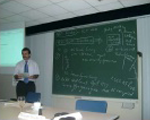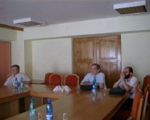Foundation for promoting
Information and Communication Technology
Cisco Networking Academy Program, Constanta, Romania
CISCO Learning Subscription - CISCO® - CCNA® v7, CCNA® Security,
Cisco® IT Essentials:PC Hardware and Software, NDG Linux®,
PCAP: Programming Essentials in Python,
Cisco® IoT Fundamentals (Arduino, Raspberry PI, Python),
CLA: Programming Essentials in C,
CLP: Advanced Programming in C,
CPA: Programming Essentials in C++,
CPP: Advanced Programming in C++

CCNA - Cisco Certified Networking Associate®
Enrollment
CCNA®v7
General Description
Cisco Systems® Company, worldwide leader in technology and innovation, by its representative in Romania and Romanian Ministry of Research and Education, has established a partnership agreeing to join CISCO Networking Academy program. More than 191 other countries have become members of this program, with over 24 million students starting with 1997.
Cisco Networking Academy Program has developed in Romania by virtue of a Strategic Protocol of Collaboration signed by Romanian Ministry of Research and Education and Cisco Systems. This program is meant to update and complete knowledge for people interested in computer networks, in ICT more generally.
As a Cisco Networking Academy, the Foundation for promoting Information and Comunication Technology (ICT Foundation),(in Romanian: Fundatia pentru promovarea Tehnologiei Informatiei si Comunicatiei), Constanta, Romania, delivers a comprehensive, 21st century learning experience to help students develop the foundational ICT skills needed to design, build, and manage networks, along with career skills such as collaboration, problem solving, and critical thinking. With an active presence for over 25 years, ICT Foundation is specialized in courses which prepare students for a career in Information and Communication Technology. Courses are taught by teachers from High School and University. Courses coordinator: Assoc. Prof. Eugen PETAC, Ph.D., Cisco Instructor Excellence Award, Cisco Instructor Excellence Advanced,, Cisco Instructor Years of Service .
ICT Foundation, Constanta, is formed as a Romanian juridical person with private law, nongovernmental, nonpolitical, nonprofit, impartial, independent and with no patrimonial purpose, for promoting Information and Communication Technology in all Romanian social environments.
"The 25 years of service badge is awarded to an instructor for dedicated participation in and passionate advocacy of Cisco Networking Academy over a period of 25 years. This badge recognizes the instructor as one of the earliest adopters of Cisco Networking Academy and a champion of student success through education."
The advantages of the settled partnership are:
- The students are properly trained for future framing for job selection concerning Information and Comunication Technology;
- The companies will benefit from information and communication technology specialists, proper trained and certified.
At the end of each course the students receive a certificate of completion of each semester, issued by Cisco Systems and countersigned by ICT Foundation, Constanta, Romania, in which the volume and type of material studied and graduate skills are indicated. A course is considered completed with good results by reaching a percentage of minimum 80%. This percentage is obtained as a result of a good preparation of the student as a result of the accumulation of theoretical and practical knowledge, being followed by successful online exams on the Cisco server from the USA, as well as carrying out practical laboratory activities. The online exams that are sustained and the practical activities, are conducted in the laboratory of our institution, targeting each chapter, plus the pre-final and final assessments.
Foundation for promoting Information and Communication Technology (ICT Foundation), Constanta, Romania, was awarded the "2015 Academy Curriculum Excellence Award", in recognition of CCNA Curriculum Excellence and lasting contribution to the Cisco Networking Academy program®, by the Cisco Networking Academy, last April 16, 2016. The annual Academy Curriculum Excellence award is presented to one academy in each region for achieving excellence in teaching a curriculum. The Cisco Networking Academy program uses a rigorous process to select academies for this award based on several criteria. Assoc. Prof. Eugen Petac, Ph.D., received the award on behalf of the ICT Foundation.
CISCO Lab, ICT Foundation, Constanta
Cisco CCNA certification exams
Cisco Systems®, world leader in Information and Communications Technology - ICT has put together the program CCNA® (Cisco Certified Networking Associate), unique by its content and structure.
CCNA® (Cisco Certified Networking Associate) is composed by a theoretical and practical course. At ICT Foundation, Constanta, Romania, the training process is personalized for every student. The theoretical part is presented in English and it can be accessed on-line. This is presented rhythmically and documented in the training program conducted under the direction of a teacher/instructor. The practical part takes place in the Cisco Academy laboratory of the ICT Foundation, Constanta, Romania, which is equipped with computers, software, simulators and proper Cisco Systems equipment. The course cover the networking basics, from Local Area Network (LAN) and Metropolitan Area Network (MAN) to Wide Area Network (WAN).
The course is addresseed to high school and university students, as well as people working in operating, designing, building and maintaining computer networks and modern data communication systems. The course is also recommended for those students who choose interdisciplinary training.
Since the '80's networks, which used coaxial thin cable and which were used mostly for one building, nowadays it has reached a moment when computers, generally intelligent systems, not connected to networks or Internet don't exists. The technologies used for data communication are more complex, the percentage of the people using computers has been exponential during the last decade. In fact, all activity fields use, for various purposes, network computers.
Cisco defines the Internet of Everything (IoE) as "bringing together people, process, data, and things to make networked connections more relevant and valuable than ever before - turning information into actions that create new capabilities, richer experiences, and unprecedented economic opportunity for businesses, individuals, and countries".
In order to ensure professional data communication services it has been proved that professional equipment isn't enough. Qualified specialists are needed with high quality training.
A study conducted by IDC requested by Cisco Systems shows what the situation in the workforce in ICT (Information and Communication Technology). Career development of our graduates is a goal to which we contribute by carrying out a high quality of teaching, appropriate for all activities of the Foundation for promoting ICT (ICT Foundation), Constanta, Romania.
Constanta.
Cisco® has created a new version of CCNA®, CCNA v7.X version - CCNAv7®, three semesters, in response to the requests of administrators, instructors and students/trainees in the context of the current development and in the immediate future of the Society. The courses provide relevant lessons with practical aspects, being accompanied by relevant case studies and practical laboratory materials. Depending on the achievements and their educational/academic goals, in the context of basic training that targets a certain level of training, the CCNA training programs caters to different levels of students/learners, from those who know the basics of computer continuing with those analytical skills, to those passionate for developing software systems engineering, system administration/ network administration.
At the end of each semester of the CCNA® course (CCNAv7®, 3 semesters) the students will receive a Certificate of Completion of each semester, issued by Cisco Systems® and countersigned by ICT Foundation, Constanta, Romania in which the volume and type of material studied and graduate skills are indicated. A course is considered completed with good results by reaching a percentage of minimum 80%. This percentage is obtained as a result of a good preparation of the student as a result of the accumulation of theoretical and practical knowledge, being followed by successful online exams on the Cisco® platform from the USA, as well as carrying out practical laboratory activities. The online exams that are sustained and the practical activities, are conducted in the laboratory of our institution, targeting each chapter, plus the practice final and final assessments. The CCNA certification (Cisco Certified Networking Associate), is obtained after the accumulation of knowledge in computer networks and data communications. CCNA program graduates receive discounts of 58% to support this certification.
Depending on the achievements and their educational/academic goals, in the context of basic training that targets a certain level of training, the CCNA® training programs caters to different levels of students/learners, from those who know the basics of computer continuing with those analytical skills, to those passionate for developing software systems engineering, system administration/ network administration.
Cisco CCNA v7 - Course Structure
Cisco CCNA 1 - Introduction to Networks (ITN)
Cisco CCNA 2 - Switching, Routing, and Wireless Essentials (SRWE)
Cisco CCNA 3 - Enterprise Networking, Security, and Automation (ENSA)
In each semester, Networking Academy® students will learn technology concepts with the support of interactive media and apply and practice this knowledge through a series of hands-on and simulated activities that reinforce their learning.
Network Security® course is addressed to those who graduated from the CCNA® course described above. It is organized within a semester, involving both theoretical and practical aspects. Being of a similar approach as the CCNA program, Network Security® provides the premises for training in a field of a great interest, that of security systems and computer networks, in the context of small and medium organizations.
Curriculum Description
CCNAv7® teaches comprehensive networking concepts, from network applications to the protocols and services provided to those applications by the lower layers of the network. Students will progress from basic networking to more complex enterprise and theoretical networking models later in the curriculum.
The CCNAv7® curriculum offers the following features and benefits:
- Students learn the basics of routing, switching, and advanced technologies to prepare for the CCNA certification exam, networking related degree programs, and entry-level careers.
- The language used to describe networking concepts is designed to be easily understood by learners at all levels and embedded interactive activities help reinforce comprehension.
- Courses emphasize critical thinking, problem solving, collaboration, and the practical application of skills.
- Multimedia learning tools, including videos, games, and quizzes, address a variety of learning styles and help stimulate learning and promote increased knowledge retention.
- Hands-on labs and Packet Tracer® simulation-based learning activities help students develop critical thinking and complex problem solving skills.
- Embedded assessments provide immediate feedback to support the evaluation of knowledge and acquired skills
CCNA: Introduction to Networks
The first course in the CCNA curriculum introduces the
architectures, models, protocols, and networking elements that
connect users, devices, applications and data through the
Internet and across modern computer networks including IP
addressing and Ethernet fundamentals.
By the end of the course, students can build simple local area
networks (LAN) that integrate IP addressing schemes,
foundational network security, and perform basic configurations
for routers and switches.
Module 1: Networking Today
Module 2: Basic Switch and End Device Configuration
Module 3: Protocols and Models
Module 4: Physical Layer
Module 5: Number Systems
Module 6: Data Link Layer
Module 7: Ethernet Switching
Module 8: Network Layer
Module 9: Address Resolution
Module 10: Basic Router Configuration
Module 11: IPv4 Addressing
Module 12: IPv6 Addressing
Module 13: ICMP
Module 14: Transport Layer
Module 15: Application Layer
Module 16: Network Security Fundamentals
Module 17: Build a Small Network
Acquired skills:
CCNAv7-Introduction to Networks® includes the following features:
- Explain the advances in modern network technologies.
- Implement initial settings inlcuding passwords, IP addressing, and default gateway parameters on a network switch and end devices.
- Explain how network protocols enable devices to access local and remote network resources.
- Explain how physical layer protocols, services, and network media support communications across data networks.
- Calculate numbers between decimal, binary, and hexadecimal systems.
- Explain how media access control in the data link layer supports communication across networks.
- Explain how Ethernet operates in a switched network.
- Explain how routers use network layer protocols and services to enable end-to-end connectivity.
- Explain how ARP and ND enable communication on a local area network.
- Implement initial settings on a router and end devices.
- Calculate an IPv4 subnetting scheme to efficiently segment your network
- Calculate an IPv6 subnetting scheme to efficiently segment your network.
- Explain how ICMP manages messaging between devices.
- Compare the operations of transport layer protocols in supporting end-to-end communcation.
- Explain the operation of application layer protocols in providing support to end-user applications.
- Configure switches and routers with device hardening features to enhance security.
- Implement a network design for a small network to include a router, a switch, and end devices.
CISCO Lab, ICT Foundation, Constanta
Cisco CCNA certification exams
CCNA: Switching, Routing and Wireless Essentials
The second course in the CCNA curriculum focuses on switching
technologies and router operations that support small to medium
business networks and includes wireless local area networks
(WLAN) and security concepts.
Students learn key switching and routing concepts. They can
perform basic network configuration and troubleshooting, identify
and mitigate LAN security threats, and configure and secure a
basic WLAN.
Module 1: Basic Device Configuration
Module 2: Switching Concepts
Module 3: VLANs
Module 4: Inter-VLAN Routing
Module 5: STP Concepts
Module 6: EtherChannel
Module 7: DHCPv4
Module 8: SLAAC and DHCPv6
Module 9: FHRP Concepts
Module 10: LAN Security Concepts
Module 11: Switch Security Configuration
Module 12: WLAN Concepts
Module 13: WLAN Configuration
Module 14: Routing Concepts
Module 15: IP Static Routing
Module 16: Troubleshoot Static and Default Routes
Acquired skills:
CCNAv7-Switching, Routing and Wireless Essentials® includes the following features:
- Configure devices by using security best practices.
- Explain how Layer 2 switches forward data.
- Implement VLANs and trunking in a switched network.
- Troubleshoot inter-VLAN routing on Layer 3 devices.
- Explain how STP enables redundancy in a Layer 2 network.
- Troubleshoot EtherChannel on switched links.
- Implement DHCPv4 to operate across multiple LANs.
- Configure dynamic address allocation in IPv6 networks.
- Explain how FHRPs provide default gateway services in a redundant network.
- Explain how vulnerabilities compromise LAN security.
- Implement switch security to mitigate LAN attacks.
- Explain how WLANs enable network connectivity.
- Implement a WLAN using a wireless router and WLC.
- Explain how routers use information in packets to make forwardig decisions.
- Configure IPv4 and IPv6 static routes.
- Troubleshoot static and default route configurations.
CISCO Lab, ICT Foundation, Constanta
Cisco CCNA certification exams
CCNAv7: Enterprise Networking, Security, and Automation
The third CCNA course describes the architectures and considerations
related to designing, securing, operating, and troubleshooting enterprise
networks including wide area network (WAN) technologies & quality of service
(QoS) mechanisms for secure remote access, along with software defined
networking, virtualization, & automation concepts supporting network digitization.
Students gain skills to configure and troubleshoot enterprise networks,
and learn to identify and protect against cybersecurity threats. They are
introduced to network management tools and learn key concepts of software
defined networking, including controller based architectures and how
application programming interfaces (APIs) enable network automation.
Module 1: Single-Area OSPFv2 Concepts
Module 2: Single-Area OSPFv2 Configuration
Module 3: Network Security Concepts
Module 4: ACL Concepts
Module 5: ACLs for IPv4 Configuration
Module 6: NAT for IPv4
Module 7: WAN Concepts
Module 8: VPN and IPsec Concepts
Module 9: QoS Concepts
Module 10: Network Management
Module 11: Network Design
Module 12: Network Troubleshooting
Module 13: Network Virtualization
Module 14: Network Automation
Acquired skills:
CCNAv7- Enterprise Networking, Security, and Automation® includes the following features:
- Explain how single-area OSPF operates in both point-to-point and broadcast multiaccess networks.
- Implement single-area OSPFv2 in both point-to-point and broadcast multiaccess networks.
- Explain how vulnerabilities, threats, and exploits can be mitigated to enhance network security.
- Explain how ACLs are used as part of a network security policy.
- Implement IPv4 ACLs to filter traffic and secure administrative access.
- Configure NAT services on the edge router to provide IPv4 address scalability.
- Explain how WAN access technologies can be used to satisfy business requirements.
- Explain how VPNs and IPsec secure site-to-site and remote access connectivity.
- Explain how networking devices implement QoS.
- Implement protocols to manage the network.
- Explain the characteristics of scalable network architectures.
- Troubleshoot enterprise networks.
- Explain the purpose and characteristics of network virtualization.
- Explain how network automation is enabled through RESTful APIs and configuration management tools.
CISCO Lab, ICT Foundation, Constanta
Cisco CCNA certification exams
More informations
Joining conditions: English language at a medium level, knowledge of basics elements in web navigation.
The lecture is hold by Associate Professor Eugen PETAC, Ph.D., Cisco Instructor Excellence Award, Cisco Instructor Excellence Advanced,, Cisco Instructor Years of Service .
Participation fee: 195 EUR per semester, payable in lei, BNR exchange transaction (final price, no VAT). One can either choose full payment for the entire course (three semesters/ four semesters) or to pay for each semester before it starts.
The organizers grant:
1. Qualified professors, from the specialized and certified university and high school teaching staff, with professional degrees certified by Cisco;
2. Modern teaching methods.
3. One by one computer access at a computer upgraded with multimedia;
4. The Customized Training Program provides education, training and support services;
5. Specialized Cisco networking equipment at ICT Foundation laboratory;
6. Customized training program for each individual learner.
7. Latest information, ensured by Cisco Networking Academy.
The courses take place at: The Foundation for promoting Information and Communication Technology (ICT Foundation).
The beginning of the course: will be fixed by a common agreement (between ICT Foundation and students).
We ask you to view the detailed content of the course.
Enrollment: Monday-Friday, 16.00-18.00. Please contact us by phone or email.









